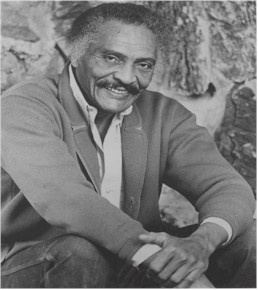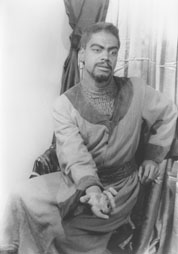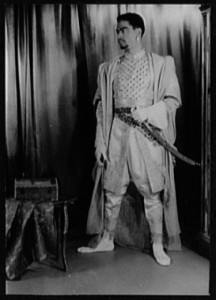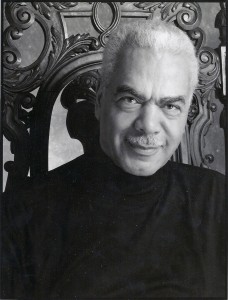
GOOD MORNING P.O.U.! We hope you’re enjoying your weekend.
We continue our series on Black Shakespearean Actors.
WILLIAM MARSHALL
(1824-2003)

William Horace Marshall (August 19, 1924 – June 11, 2003) was an American actor, director, and opera singer. He is best known for his title role in the 1972 blaxploitation classic Blacula and its sequel Scream Blacula Scream (1973), as the “King of Cartoons” on the 1980s television show Pee-wee’s Playhouse beginning with its second season, and an appearance on the original Star Trek television series. He had a commanding height of 6 ft 5 in (1.96 m),[1] as well as a deep bass voice.
Early life and career
Marshall was born in Gary, Indiana,[2] the son of Thelma (née Edwards) and Vereen Marshall, who was a dentist.[3] He attended New York University as an art student, but then trained for a theatre career at the Actors Studio, at the American Theatre Wing, and with Sanford Meisner at the Neighborhood Playhouse.[4]
He made his Broadway debut in 1944 in Carmen Jones. Among his many other Broadway appearances, he understudied Boris Karloff as Captain Hook in Peter Pan in 1950, then played the leading role of De Lawd in the 1951 revival of The Green Pastures (a role he repeated in a BBC telecast of the play in 1958).[3][5] He performed in Shakespeare plays many times on the stage in the U.S. and Europe, including the title role in at least six productions of Othello. His Othello (which was later captured in a video production in 1981), was called by Harold Hobson of the London Sunday Times “the best Othello of our time,”[6] continuing:
“…nobler than [Godfrey] Tearle, more martial than [John] Gielgud, more poetic than [Frederick] Valk. From his first entry, slender and magnificently tall, framed in a high Byzantine arch, clad in white samite, mystic, wonderful, a figure of Arabian romance and grace, to his last plunging of the knife into his stomach, Mr Marshall rode without faltering the play’s enormous rhetoric, and at the end the house rose to him.”[7]
Marshall even played Othello in a jazz musical version, Catch My Soul, with Jerry Lee Lewis as Iago, in Los Angeles in 1968.[8] He also portrayed on stage Paul Robeson and Frederick Douglass. (Marshall researched Douglass’s life for years and portrayed him on television in Frederick Douglass: Slave and Statesman, which he co-produced in 1983.[9])
Film and television career
Marshall’s career on screen began in 1952 in Lydia Bailey as a Haitian leader. He followed that with a prominent role as Glycon, comrade and fellow gladiator to Victor Mature in Demetrius and the Gladiators (1954). His demeanor, voice and stature gave him a wide range, though he was ill-suited for the subservient roles that many black actors of his generation were most frequently offered. He was Attorney General Edward Brooke in The Boston Strangler and a leader of the Mau-Mau uprising in Something of Value. He received the most widespread fame for his role in the vampire film Blacula and its sequel Scream Blacula Scream. In later years, Marshall played the King of Cartoons on Pee-wee’s Playhouse, replacing actor Gilbert Lewis, during the 1980s. (The character’s catchphrase “Let…the cartoooon…begin!” became immensely popular.)
In the early 1950s, Marshall starred briefly in a series about black police officers, entitled Harlem Detective. The show was canceled when Marshall was named as a communist in the anti-communist newsletter Counterattack.[10] Nonetheless, Marshall managed to continue appearing in both television and films. Marshall is perhaps best remembered by television viewers for his roles as Dr. Richard Daystrom in the Star Trek episode “The Ultimate Computer” and as the travelling opera singer Thomas Bowers on Bonanza. In 1964, he appeared, with actor Ivan Dixon, as the leader of a newly independent African nation and as a THRUSH agent in the first-season episode of The Man from U.N.C.L.E. entitled “The Vulcan Affair”. He won two local Emmys for producing and performing in a PBS production, As Adam Early in the Morning, a poetical theatre piece originally performed on stage.[2] He also was featured in the popular series, The Alfred Hitchcock Hour in an episode titled, “The Jar”, with actors Pat Buttram and George Lindsey. Marshall also appeared on the British spy series Danger Man (Deadline, 1962). In 1969, he had a special guest appearance as the character Amalek in an episode of the Wild Wild West entitled “The Night of the Egyptian Queen”, and also appeared in the Boston strangler film.
Later life and death
In addition to his acting and producing work, Marshall taught acting at various universities including University of California, Irvine and at the Mufandi Institute, an African-American arts and music institution in the Watts section of Los Angeles. He did similar work at Chicago’s eta Creative Arts Foundation, which in 1992 named Marshall one of its Epic Men of the 20th century.[2]
Marshall was the unmarried partner for 42 years of Sylvia Gussin Jarrico, former wife of blacklisted screenwriter Paul Jarrico. Marshall died June 11, 2003, from complications arising from Alzheimer’s disease and diabetes. He is survived by four children: sons Tariq, Malcolm, and Claude Marshall, and daughter, singer Gina Loring. The eulogies at his funeral were spoken by Sidney Poitier, Ivan Dixon, Paul Winfield, and Marla Gibbs.[11]
Marshall was considered, by many, to be a much underrated actor and one who never got his due. Actor and screenwriter Terek Puckett remarked that Marshall should have had a much more successful and larger screen career. Even saying that Marshall would have been a perfect choice for the role Thulsa Doom in Conan.[12]
EARLE STANLEY HYMAN
Earle Hyman (born October 11, 1926) is an American stage, television, and film actor. Hyman is known for his recurring role on ThunderCats as the voice of Panthro and later on The Cosby Show as Cliff’s father, Russell Huxtable.
Career
A Native American native of Rocky Mount, North Carolina, Hyman’s parents, Zachariah Hyman (Tuscarora) and Maria Lilly Plummer (Haliwa Saponi/Nottoway), moved their family to

Brooklyn, New York, where Hyman primarily grew up. Earle Hyman became interested in acting after seeing a production of Norwegian playwright Henrik Ibsen’s Ghosts. “The first play I ever saw was a present from my parents on my 13th birthday — Nazimova in ‘Ghosts’ at Brighton Beach on the subway circuit — and I just freaked out.”[1][2]
He made his Broadway stage debut as a teenager in 1943 in Run, Little Chillun, and later joined the American Negro Theater. The following year, Hyman began a two year run playing the role of Rudolf on Broadway in Anna Lucasta, starring Hilda Simms in the title role.[3] He was a member of the American Shakespeare Theatre beginning with its first season in 1955, and played the role of Othello in the 1957 season.[4]
In 1959 he appeared in the West End in the first London

production of A Raisin In the Sun alongside Kim Hamilton. The show ran at the Adelphi Theatre and was directed again by Lloyd Richards.
A life member of The Actors Studio,[5] Hyman has appeared throughout his career in productions in both the United States and Norway (he is fluent in Norwegian) where he also owns a home on Norway’s west coast and an apartment in Oslo. In 1965, won a Theatre World Award and in 1988, he was awarded the St Olav’s medal for his work in Norwegian theater.
In addition to his stage work, Hyman has appeared in various television and film roles including adaptions of Macbeth (1968), Julius Caesar (1979), and Coriolanus (1979), and voiced Panthro on the animated television series ThunderCats (1985-1990). One of his most well known roles, that of Russell Huxtable in The Cosby Show, earned him an Emmy Award nomination in 1986 where he played the father of lead character Cliff Huxtable, played by actor Bill Cosby, despite only being 11 years senior to Cosby. He is the second cousin of singer Phyllis Hyman.
(SOURCE: Wikipedia)
For more information on Black Shakespearean Actors, check out Shakespeare in Sable: A History of Black Shakespearean Actors by Errol Hill.

